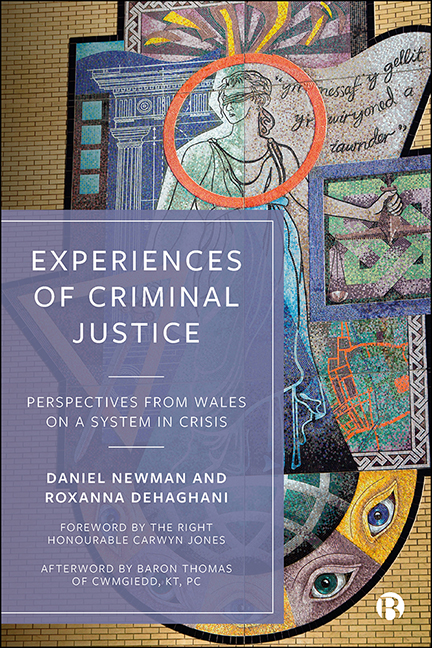Book contents
- Frontmatter
- Contents
- List of Figures and Tables
- Foreword
- Acknowledgements
- 1 Why Wales?
- 2 A System in Crisis
- 3 The People and Their Experiences
- 4 Criminal Justice in Its Place
- 5 Pressures of Practice
- 6 Criminal Justice Relationships
- 7 Navigating the Criminal Justice System
- 8 Doing Criminal Justice Differently
- Afterword
- References
- Index
2 - A System in Crisis
Published online by Cambridge University Press: 15 September 2022
- Frontmatter
- Contents
- List of Figures and Tables
- Foreword
- Acknowledgements
- 1 Why Wales?
- 2 A System in Crisis
- 3 The People and Their Experiences
- 4 Criminal Justice in Its Place
- 5 Pressures of Practice
- 6 Criminal Justice Relationships
- 7 Navigating the Criminal Justice System
- 8 Doing Criminal Justice Differently
- Afterword
- References
- Index
Summary
Introduction
The criminal justice system of England and Wales has long been in decline. According to the solicitors’ professional body – the Law Society – the system is now ‘crumbling’ (Law Society, 2019), and The Secret Barrister (2018) – an anonymous, best-selling legal blogger – has deemed the law to be ‘broken’. In recent times, budget cuts have also been made to the police service, the courts, the CPS and other criminal justice institutions such as prisons. Criminal defence lawyers have seen their fees stagnate or reduce. Defendants have been both compelled to participate in the criminal process and prevented from doing so (Owusu-Bempah, 2017). Some accused have been left to face the criminal process unaided (see Gibbs, 2016). Within the frame of neoliberalism, the criminal process has also become more managerialist and more punitive, adding further to the challenges.
In this chapter we examine the impact of austerity and neoliberalism on the criminal process, also examining some of the policies affecting criminal justice in England and Wales. Neoliberalism, in particular, has resulted in punitive excess and responsibilization, aimed particularly towards the poor and disenfranchised (Garland, 2001; Wacquant, 2009; Bell, 2011). Austerity has forced ‘violence’ upon marginalized groups such as asylum seekers and the street-homeless (Cooper and Whyte, 2017). We contribute further to these debates by examining how the state has failed – or has deliberately decided not – to properly support those within the criminal process, namely those who require – and are thus denied – access to justice. Within this frame, we address Home Office budget cuts to policing, Ministry of Justice budget cuts to (criminal) legal aid funding, the challenges facing the CPS, and court closures pursued in the name of ‘modernization’. Criminal legal aid cuts will form a significant focus of our discussion: how lawyers have been torn, through practice restraints necessitated by financial limitations, from their ‘zealous advocate’ ideal type (Smith, 2013; Smith and Cape, 2017), which in turn undermines their clients’ proper access to justice (Gibbs and Ratcliffe, 2019). In doing so, we will draw out both the effects upon England and Wales and the disproportionate impact on Wales.
Building upon our earlier work (Dehaghani and Newman, 2017; Dehaghani and White, 2020; Dehaghani, 2021), towards the end of this chapter we introduce vulnerability theory. This theoretical framework loosely underpins our exploration of the criminal process in this book, upon which we later reflect in Chapter 8.
- Type
- Chapter
- Information
- Experiences of Criminal JusticePerspectives from Wales on a System in Crisis, pp. 23 - 46Publisher: Bristol University PressPrint publication year: 2022

